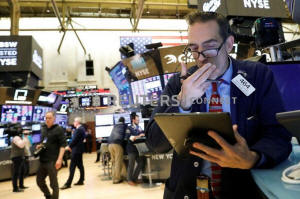Stocks plunge on coronavirus fears even as U.S. ramps up fight against
spread
 Send a link to a friend
Send a link to a friend
 [February 28, 2020]
By Sinéad Carew and Ted Hesson [February 28, 2020]
By Sinéad Carew and Ted Hesson
NEW YORK/WASHINGTON (Reuters) - U.S. stocks
plummeted on Thursday as fears about the effect of the coronavirus
outbreak on economic growth flared even as U.S. officials pledged that
they were stepping up efforts to safeguard Americans from the virus'
spread.
A day after President Donald Trump told Americans that the risk from
coronavirus remained "very low," the S&P 500 <.SPX> logged its fastest
drop of at least 10% in history in a sixth straight day of declines. The
broad market average has lost 12% since hitting a record close on Feb.
19.
The Dow <.DJI> has fallen as much as 12.9% and the Nasdaq <.IXIC> has
lost as much as 13%.
Two U.S. officials told Reuters the Trump administration was considering
invoking special powers to rapidly expand domestic production of
protective masks and clothing to help combat the coronavirus in the
United States.

During an interagency call on Wednesday, officials from Health and Human
Services (HHS) and the Department of Homeland Security (DHS) discussed
the possibility of invoking the Defense Production Act for the
manufacture of "personal protective equipment" that can be worn by
healthcare workers to prevent infection, according to a DHS official.
A White House official confirmed that the administration was exploring
the use of the law to spur manufacturing of protective gear. Both
officials requested anonymity to discuss the issue.
Amid a flurry of sometimes contradictory messages from Washington, HHS
Secretary Alex Azar late on Thursday proclaimed that "everyday Americans
don't need to be worried" about coronavirus. He was quick to add, "But
that can change."
During a White House ceremony celebrating Black History Month, Trump
countered congressional Democrats' charges that administration
preparations were lagging. "Fortunately we made the early moves," Trump
said. "It's working out very professionally. We're doing a tremendous
job."
Robert Redfield, director of the Centers for Disease Control and
Prevention (CDC), told lawmakers the agency revised its criteria for who
should be tested for the coronavirus and was shipping more test kits to
states.
Redfield also said CDC is investigating how long this virus can survive
on surfaces, remaining infectious.
California only has about 200 test kits, an "inadequate" number, but has
been in "constant contact with federal agencies" who have promised to
send a fresh supply in coming days, Governor Gavin Newsom told a news
briefing earlier.
Quick confirmation of coronavirus cases is crucial to rapid response by
local health authorities, and states previously reported that some test
kits provided by CDC were producing inconclusive results.
Azar told a House of Representatives committee on Thursday that at least
40 public health labs should now be able to test specimens for
coronavirus and that could more than double as soon as Friday.
[to top of second column]
|

Traders work on the floor at the New York Stock Exchange (NYSE) in
New York, U.S., February 27, 2020. REUTERS/Brendan McDermid

Some state and local public health workers have expressed doubts
about how quickly the country will be able to scale up its testing
capability, however.
Scott Becker, the CEO of the Association of Public Health
Laboratories (APHL), said his group had worked with the CDC and the
Food and Drug Administration to develop a way to quickly increase
testing capacity but these tests will still have to be validated by
states, which could take several days.
"If quality control goes well as expected by the end of next week,
upwards of 40 labs will have testing capabilities in addition to the
12 we have," Becker told Reuters.
The number of confirmed U.S. cases is still relatively small at 60,
most of them repatriated American passengers from the Diamond
Princess cruise ship docked in Japan.
POLITICS
Funding to combat the health crisis has become a political issue in
an election year. Trump, a Republican, is seeking $2.5 billion from
Congress to boost the government's response. Senate Democratic
Leader Chuck Schumer called for $8.5 billion.
Senate Majority Leader Mitch McConnell, a Republican, said he hoped
a bipartisan effort could produce a deal on funding within the next
two weeks.
China, where the coronavirus started, has borne the brunt of the
outbreak, recording nearly 80,000 infections and more than 2,700
deaths. The virus has spread to another 44 countries, where around
3,500 cases and 54 deaths have been reported.
But with new infections reported around the world now surpassing
those in mainland China, World Health Organization Director General
Tedros Adhanom Ghebreyesus said even rich nations should prepare for
surprises.

"No country should assume it won't get cases, that would be a fatal
mistake, quite literally," Tedros said.
Various treatments are being tested for the virus, which can lead to
pneumonia, but a vaccine may take up to 18 months to develop, health
officials have said.
Trump has been increasingly alarmed by market reaction, which he
considers a barometer of the economy's health and sees as important
to his re-election in November.
(Additional reporting by Susan Heavey, Doina Chiacu, Michael Erman,
David Morgan and Lisa Lambert in Washington and Jonathan Allen in
New York, Writing by Sonya Hepinstall and Richard Cowan; Editing by
Bill Berkrot and Cynthia Osterman)
[© 2020 Thomson Reuters. All rights
reserved.] Copyright 2020 Reuters. All rights reserved. This material may not be published,
broadcast, rewritten or redistributed.
Thompson Reuters is solely responsible for this content. |